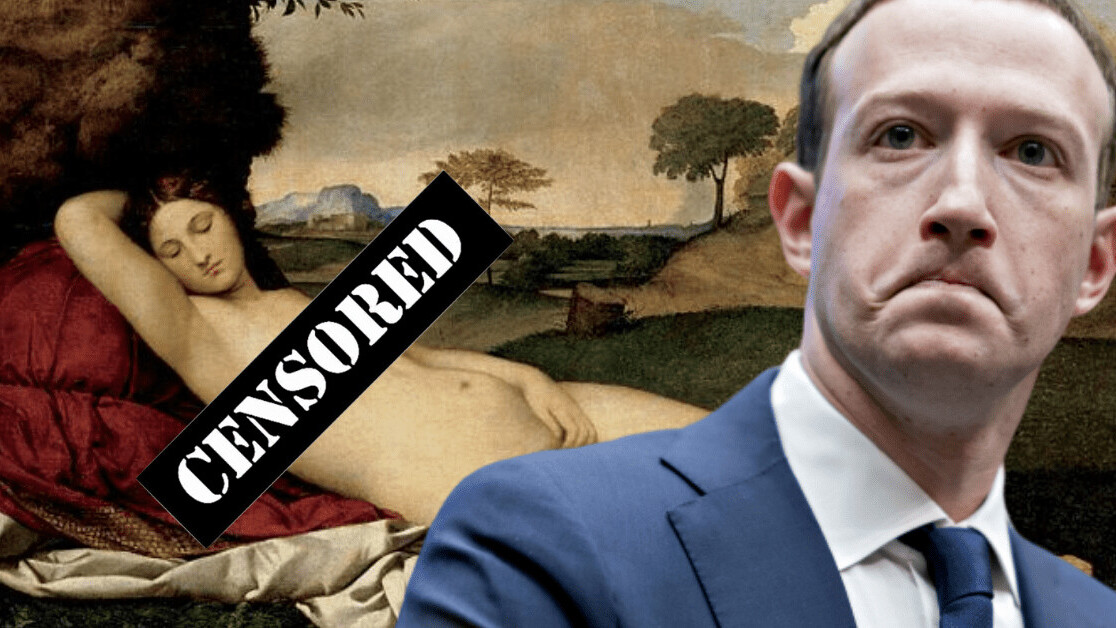
Last year, Facebook began clamping down on ‘inappropriate content‘ by banning discussion around “sexual preference,” “sexual roles,” “breasts,” and “buttocks” on the site. The tech giant has now quietly updated its policies, under the guise of preventing “sexual solicitation,” and now restricts solicitation involving “sexual emoji or emoji strings” and nudity “including long shots of fully nude butts” — further restricting the type of posts sex workers and NSFW artists are allowed to share.
As first reported by XBIZ, Facebook updated its policies sometime between September 7 and October 24. Now, Facebook’s Community Standards detail two new criteria for defining sexual solicitation. The first: A user who asks for “content implicity or indirectly offers or asks for nude imagery, sex or sexual partners, or sex chat conversations.” The second details suggestive elements, including “imagery of real individuals with nudity covered by human parts.”
For Erika Lust, an award-winning Swedish erotic film director, these strict guidelines prove, for NSFW artists, it’s almost “impossible to exist on these platforms,” she told TNW.
With a degree in human rights, political science, and feminism in her back pocket, Lust has played an instrumental role in defining the importance of representation and diversity in erotic movies. Lust paired her interest in female sexuality with filmmaking to create diverse and realistic porn movies from the female perspective without degrading women or playing into stereotypical gender roles. But promoting her work on social media has been a struggle.
“I’ve had clean photos removed before and I’ve also experienced shadow-banning on both Instagram and Twitter,” Lust said. “This means when people tried to search for my account, I didn’t appear in the search terms. For people who already followed me, I would be listed tenth on the list when searching with my username.”
At the time, Instagram allegedly denied that it shadow-banned Lust’ account. “But after I ran a campaign about it on my account and asked my followers and other female artists working with sex to share their experiences, Instagramed lifted the ban,” Lust added.
As Facebook nows restricts the use of emoji being used in a sexual context, Lust questioned the move: “Surely everything I say as a porn director will be interpreted by some as ‘suggestive.’”
For feminist porn directors like Lust, and others sharing NSFW content on social media, Facebook is a place to reach certain audiences and build a community. “We have to self-censor ourselves in an effort to avoid being censored or deleted, but this isn’t enough,” Lust said. “Even when we self-censor and follow the ‘rules,’ they don’t care because they see women, and they see sex, and that’s enough for them to demote or cancel us.”
Facebook’s double standards
As a platform that blocks the phase “men are trash,” yet allows “women are trash” on its platform, it should come as no surprise that Facebook and Instagram don’t celebrate women taking ownership of their own body, Lust argues.
There are painfully obvious double standards on the social networks. “The Dan Bilzerians of the world are free to keep sending their misogynistic message that women are only accessories to their lavish lifestyle. When Dan posts a picture using a naked woman as a table to rest his trophy on, he’s not censored,” Lust explained.
“But when Rupi Kaur posts a photo of her fully clothed in bed with a period stain she is censored… what message does this send? It tells me that we live in a male-dominated world that doesn’t want the status quo changed, where media allows commodification of women but keeps censoring their bodies when they take ownership of it. What stops any men from doing this in real life if this is the message social media keeps sending out?”

“The rules are grey and very vague,” Lust said. “How does an algorithm differentiate between a suggestive peach emoji and an edible peach emoji? And does it really matter?”
The future for NSFW artists is ‘bleak’
If social media continues to purge NSFW accounts and take control of people’s sexual expression, Lust argues the future looks bleak. “I think people who want to see a broader spectrum of sexual content and bodies will have no choice but to move to other platforms soon.
“With the demise of Tumblr there are a lot of sexually expressive artists, sex workers, and people in general who want to explore their sexuality online with nowhere to go,” Lust added.
Instagram is missing out on an opportunity to facilitate and support important conversations — particularly as discussions and notions of sexuality are becoming more nuanced as time moves forward.
“This type of censorship is going to affect more than artists, sex workers, and companies like mine,” Lust added. “Amidst all of this debate about what censorship should look like, I worry we have forgotten why censorship is raised in the first place — to protect young people from damaging and dangerous or simply inappropriate content.”
The content Facebook and Instagram are blocking, such as female nipples, aren’t reflecting its commitment to protect minors. “They are instead creating a tide of moral panic resulting in ridiculous limits often detrimental to those they’re trying to protect.”
The occasional exposure to something that might not be entirely age appropriate — be that an aubergine emoji in sexual context or a female nipple — is a small price to pay if the slackening of censorship policy surrounding content of a sexual nature means young people are better able to gain access to accurate information about sex, sexual health, and abuse.
“Seeing female nipples is not going to do serious harm, however an inability to report sexual abuse, or spot the signs of an STI can cause real damage.”
There are ways to filter content on the platform to keep things family-friendly for those who want it, but silencing artists and sex-positive brands seems like a regressive and myopic move.
“The type of censorship strategies fixated on preventing any and all access to sex related content do not work and can do more harm than good,” Lust said. “Our children need access to reliable information about sex and sexuality more than ever and the internet is a great space for them to find this information — prohibiting them from doing this censorship policy is failing to protect them.”
Get the TNW newsletter
Get the most important tech news in your inbox each week.




